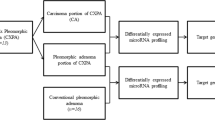Abstract
MicroRNAs (miRNAs) are endogenous non-coding RNAs that function as negative regulators of gene expression. Alterations in miRNA expression have been shown to affect tumor growth and response to chemotherapy. In this study, we explored the possible role of miRNAs in cisplatin resistance in esophageal squamous cell carcinoma (ESCC). First we assessed the sensitivity of nine human ESCC cell lines (KYSE series) to cisplatin using an in vitro cell viability assay, and then we compared the miRNA profiles of the cisplatin-sensitive and -resistant cell lines by miRNA microarray analysis. The two groups showed markedly different miRNA expression profiles, and 10 miRNAs were found to be regulated differentially between the two groups. When miR-141, which was the most highly expressed miRNA in the cisplatin-resistant cell lines, was expressed ectopically in the cisplatin-sensitive cell lines, cell viability after cisplatin treatment was increased significantly. Furthermore, we found that miR-141 directly targeted the 3′-untranslated region of YAP1, which is known to have a crucial role in apoptosis induced by DNA-damaging agents, and thus downregulated YAP1 expression. Our study highlights an important regulatory role for miR-141 in the development of cisplatin resistance in ESCC.
Similar content being viewed by others
Log in or create a free account to read this content
Gain free access to this article, as well as selected content from this journal and more on nature.com
or
References
Tsuchiya, S., Okuno, Y. & Tsujimoto, G MicroRNA: biogenetic and functional mechanisms and involvements in cell differentiation and cancer. J. Pharmacol. Sci. 101, 267–270 (2006).
Lim, L., Glasner, M., Yekta, S., Burge, C. & Bartel, D. Vertebrate microRNA genes. Science 299, 1540 (2003).
Berezikov, E., Guryev, V., van de Belt, J., Wienholds, E., Plasterk, R. & Cuppen, E. Phylogenetic shadowing and computational identification of human microRNA genes. Cell 120, 21–24 (2005).
Lewis, B., Burge, C. & Bartel, D. Conserved seed pairing, often flanked by adenosines, indicates that thousands of human genes are microRNA targets. Cell 120, 15–20 (2005).
Xie, X., Lu, J., Kulbokas, E., Golub, T., Mootha, V., Lindblad-Toh, K. et al. Systematic discovery of regulatory motifs in human promoters and 3′ UTRs by comparison of several mammals. Nature 434, 338–345 (2005).
Harfe, B. MicroRNAs in vertebrate development. Curr. Opin. Genet. Dev. 15, 410–415 (2005).
Hwang, H. & Mendell, J. MicroRNAs in cell proliferation, cell death, and tumorigenesis. Br. J. Cancer 94, 776–780 (2006).
Chen, C., Li, L., Lodish, H. & Bartel, D. MicroRNAs modulate hematopoietic lineage differentiation. Science 303, 83–86 (2004).
Croce, C. & Calin, G miRNAs, cancer, and stem cell division. Cell 122, 6–7 (2005).
O’Rourke, J., Swanson, M. & Harfe, B. MicroRNAs in mammalian development and tumorigenesis. Birth Defects Res. C Embryo Today 78, 172–179 (2006).
Zhang, B., Pan, X., Cobb, G. & Anderson, T. microRNAs as oncogenes and tumor suppressors. Dev. Biol. 302, 1–12 (2007).
Calin, G. & Croce, C. MicroRNA signatures in human cancers. Nat. Rev. Cancer 6, 857–866 (2006).
Chen, C. MicroRNAs as oncogenes and tumor suppressors. N. Engl. J. Med. 353, 1768–1771 (2005).
Croce, C. Oncogenes and cancer. N. Engl. J. Med. 358, 502–511 (2008).
Si, M., Zhu, S., Wu, H., Lu, Z., Wu, F. & Mo, Y. miR-21-mediated tumor growth. Oncogene 26, 2799–2803 (2007).
Meng, F., Henson, R., Wehbe-Janek, H., Ghoshal, K., Jacob, S. & Patel, T. MicroRNA-21 regulates expression of the PTEN tumor suppressor gene in human hepatocellular cancer. Gastroenterology 133, 647–658 (2007).
Blower, P., Chung, J., Verducci, J., Lin, S., Park, J., Dai, Z. et al. MicroRNAs modulate the chemosensitivity of tumor cells. Mol Cancer Ther. 7, 1–9 (2008).
Parkin, D., Bray, F., Ferlay, J. & Pisani, P. Global cancer statistics, 2002. CA Cancer J. Clin. 55, 74–108 (2005).
Xiao, Z., Yang, Z., Liang, J., Miao, Y., Wang, M., Yin, W. et al. Value of radiotherapy after radical surgery for esophageal carcinoma: a report of 495 patients. Ann. Thorac. Surg. 75, 331–336 (2003).
Mariette, C., Balon, J., Piessen, G., Fabre, S., Van Seuningen, I. & Triboulet, J. Pattern of recurrence following complete resection of esophageal carcinoma and factors predictive of recurrent disease. Cancer 97, 1616–1623 (2003).
Kimura, H., Konishi, K., Arakawa, H., Oonishi, I., Kaji, M., Maeda, K. et al. Number of lymph node metastases influences survival in patients with thoracic esophageal carcinoma: therapeutic value of radiation treatment for recurrence. Dis. Esophagus 12, 205–208 (1999).
Shimada, Y., Imamura, M., Wagata, T., Yamaguchi, N. & Tobe, T. Characterization of 21 newly established esophageal cancer cell lines. Cancer 69, 277–284 (1992).
Mathé, E., Nguyen, G., Bowman, E., Zhao, Y., Budhu, A., Schetter, A. et al. MicroRNA expression in squamous cell carcinoma and adenocarcinoma of the esophagus: associations with survival. Clin. Cancer Res. 15, 6192–6200 (2009).
Hiyoshi, Y., Kamohara, H., Karashima, R., Sato, N., Imamura, Y., Nagai, Y. et al. MicroRNA-21 regulates the proliferation and invasion in esophageal squamous cell carcinoma. Clin. Cancer Res. 15, 1915–1922 (2009).
Meng, F., Henson, R., Lang, M., Wehbe, H., Maheshwari, S., Mendell, J. et al. Involvement of human micro-RNA in growth and response to chemotherapy in human cholangiocarcinoma cell lines. Gastroenterology 130, 2113–2129 (2006).
Ogawa, R., Ishiguro, H., Kuwabara, Y., Kimura, M., Mitsui, A., Katada, T. et al. Expression profiling of micro-RNAs in human esophageal squamous cell carcinoma using RT-PCR. Med. Mol. Morphol. 42, 102–109 (2009).
Guo, J., Miao, Y., Xiao, B., Huan, R., Jiang, Z., Meng, D. et al. Differential expression of microRNA species in human gastric cancer versus non-tumorous tissues. J. Gastroenterol. Hepatol. 24, 652–657 (2009).
Katada, T., Ishiguro, H., Kuwabara, Y., Kimura, M., Mitui, A., Mori, Y. et al. microRNA expression profile in undifferentiated gastric cancer. Int. J. Oncol. 34, 537–542 (2009).
Fletcher, A., Heaford, A. & Trask, D. Detection of metastatic head and neck squamous cell carcinoma using the relative expression of tissue-specific mir-205. Transl. Oncol. 1, 202–208 (2008).
Feber, A., Xi, L., Luketich, J., Pennathur, A., Landreneau, R., Wu, M. et al. MicroRNA expression profiles of esophageal cancer. J. Thorac. Cardiovasc. Surg. 135, 255–260; discussion 260 (2008).
Iorio, M., Casalini, P., Piovan, C., Di Leva, G., Merlo, A., Triulzi, T. et al. microRNA-205 regulates HER3 in human breast cancer. Cancer Res. 69, 2195–2200 (2009).
Wang, Y., Lee, A., Ma, J., Wang, J., Ren, J., Yang, Y. et al. Profiling microRNA expression in hepatocellular carcinoma reveals microRNA-224 up-regulation and apoptosis inhibitor-5 as a microRNA-224-specific target. J. Biol. Chem. 283, 13205–13215 (2008).
Zhang, H., Li, M., Han, Y., Hong, L., Gong, T., Sun, L. et al. Down-regulation of miR-27a might reverse multidrug resistance of esophageal squamous cell carcinoma. Dig. Dis. Sci. 55, 2545–2551 (2010).
Hu, X., Macdonald, D., Huettner, P., Feng, Z., El Naqa, I., Schwarz, J. et al. A miR-200 microRNA cluster as prognostic marker in advanced ovarian cancer. Gynecol. Oncol. 114, 457–464 (2009).
Iorio, M., Visone, R., Di Leva, G., Donati, V., Petrocca, F., Casalini, P. et al. MicroRNA signatures in human ovarian cancer. Cancer Res. 67, 8699–8707 (2007).
Bandrés, E., Cubedo, E., Agirre, X., Malumbres, R., Zárate, R., Ramirez, N. et al. Identification by Real-time PCR of 13 mature microRNAs differentially expressed in colorectal cancer and non-tumoral tissues. Mol. Cancer 5, 29 (2006).
Gramantieri, L., Ferracin, M., Fornari, F., Veronese, A., Sabbioni, S., Liu, C. et al. Cyclin G1 is a target of miR-122a, a microRNA frequently down-regulated in human hepatocellular carcinoma. Cancer Res. 67, 6092–6099 (2007).
Porkka, K., Pfeiffer, M., Waltering, K., Vessella, R., Tammela, T. & Visakorpi, T. MicroRNA expression profiling in prostate cancer. Cancer Res. 67, 6130–6135 (2007).
Nakada, C., Matsuura, K., Tsukamoto, Y., Tanigawa, M., Yoshimoto, T., Narimatsu, T. et al. Genome-wide microRNA expression profiling in renal cell carcinoma: significant down-regulation of miR-141 and miR-200c. J. Pathol. 216, 418–427 (2008).
Strano, S., Monti, O., Pediconi, N., Baccarini, A., Fontemaggi, G., Lapi, E. et al. The transcriptional coactivator Yes-associated protein drives p73 gene-target specificity in response to DNA damage. Mol. Cell 18, 447–459 (2005).
Basu, S., Totty, N., Irwin, M., Sudol, M. & Downward, J. Akt phosphorylates the Yes-associated protein, YAP, to induce interaction with 14-3-3 and attenuation of p73-mediated apoptosis. Mol. Cell 11, 11–23 (2003).
Acknowledgements
This work was supported by grants from the Ministry of Education, Culture, Sports, Science and Technology (to ST); grants from the Ministry of Education, Culture, Sports, Science and Technology, and the New Energy and Industrial Technology Development Organization (to GT).
Author information
Authors and Affiliations
Corresponding author
Additional information
Supplementary Information accompanies the paper on Journal of Human Genetics website
Supplementary information
Rights and permissions
About this article
Cite this article
Imanaka, Y., Tsuchiya, S., Sato, F. et al. MicroRNA-141 confers resistance to cisplatin-induced apoptosis by targeting YAP1 in human esophageal squamous cell carcinoma. J Hum Genet 56, 270–276 (2011). https://doi.org/10.1038/jhg.2011.1
Received:
Revised:
Accepted:
Published:
Issue date:
DOI: https://doi.org/10.1038/jhg.2011.1
Keywords
This article is cited by
-
Tumor-secreted exosomal miR-141 activates tumor-stroma interactions and controls premetastatic niche formation in ovarian cancer metastasis
Molecular Cancer (2023)
-
The role and mechanisms of action of microRNAs in cancer drug resistance
Clinical Epigenetics (2019)
-
YAP activation protects urothelial cell carcinoma from treatment-induced DNA damage
Oncogene (2016)
-
14-3-3σ confers cisplatin resistance in esophageal squamous cell carcinoma cells via regulating DNA repair molecules
Tumor Biology (2016)
-
Epigenetic alternations and cancer chemotherapy response
Cancer Chemotherapy and Pharmacology (2016)



